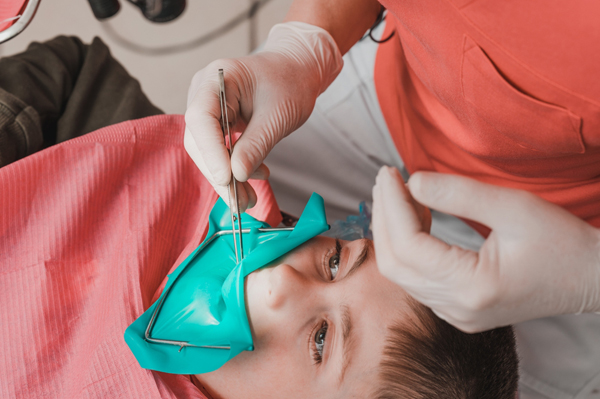Root Canal Procedure for Baby Teeth

A root canal for baby teeth is not something that is performed too often. Oftentimes, baby teeth do not require in-depth work because they will be replaced later by permanent, adult teeth. However, in some situations, baby teeth may require a root canal, in which case there are a few things to be aware of ahead of time.
The term root canal often strikes fear in individuals because it has a reputation for being a challenging and uncomfortable procedure. However, what is important to know is that a root canal is only required when absolutely necessary. It is a procedure that can restore a tooth that is in bad shape. Oftentimes, it even eliminates one's pain, which is a common symptom of an infected tooth. In the case of a root canal for baby teeth, parents may be alarmed or concerned. Thankfully, pediatric dentists have access to the most up-to-date technology and have undergone extensive training to ensure that the procedure is performed with extra care.
A quick guide to a root canal for baby teeth
Below is an overview of what is involved in a root canal for baby teeth. This information may be quite helpful to parents who are wondering what their child should expect.
Root canal for baby teeth defined
A root canal for baby teeth is very similar to a traditional root canal; however, instead of the permanent adult teeth being worked on, the pediatric dentist attempts to save a primary or baby tooth.
The goal is to remove all of the infected parts of the tooth, which are usually located in the pulp where the nerves live. Once removed, the tooth can be restored using a dental crown.
The process
To start a root canal for baby teeth, a pediatric dentist will thoroughly numb the child's oral cavity to ensure that no pain is felt. Numbing typically involves the use of a topical gel and a shot of medication. This part may take a few minutes. However, once the child is completely numb, the procedure can begin.
Next, a small dental instrument will be used to carefully expose the roots of the baby tooth. Once exposed, the dentist will either remove them completely or clean the cavity of the tooth out to get rid of any infected areas. After the cavity of the tooth is cleared out, the cavity will be cleaned and rinsed. This part is crucial as it ensures that nothing harmful gets left behind. After that, a dental material will be used to fill the area so that further damage cannot be done.
To finish a root canal for a baby tooth, the dentist will cap the entire tooth with a temporary dental crown. The temporary crown is a placeholder for a permanent one, which will be placed a couple of weeks after the initial procedure. Most commonly, for baby teeth, dental crowns are made of composite resin. This is a material that dentists use frequently because it is durable, but not too costly since the tooth will later be replaced by an adult one.
What else to know
It is often asked why baby teeth would even need a root canal to begin with, since they fall out later on. In some cases, this may prove to be correct; however, for the most part, the pediatric dentist will only opt for a root canal if the adult tooth is not ready to erupt yet. Baby teeth are meant to be placeholders until the adult teeth come through, and if there are not any teeth present until that happens, the surrounding teeth may shift, and the gums may suffer. This can also lead to other problems with eating and speech. If there are not enough teeth in the oral cavity at a young age, one's day-to-day life can be affected, which could result in the need for additional treatments.
Find out more from a pediatric dentist
A root canal for baby teeth is performed by a pediatric dentist as they have the knowledge and training to ensure a successful outcome. Parents that have further questions or concerns about the process and what to expect should consult directly with the dentist. Anything unknown can be appropriately addressed. Additionally, the dentist can evaluate the baby tooth to determine what type of action is necessary. Reach out today to learn more or to get scheduled for an appointment.
Request an appointment here: https://www.hvkidsmiles.com or call Hudson Valley Pediatric Dentistry at (845) 363-4177 for an appointment in our Middletown office.
Check out what others are saying about our services on Yelp: Read our Yelp reviews.
Recent Posts
If a cavity develops and worsens, it could lead to the risk of a dental emergency due to an infection or severe discomfort. Dental sealants significantly reduce the risk of a dental emergency by helping to prevent cavities in vulnerable areas of teeth. Read on to learn how dental sealants can prevent a dental emergency…
Protecting your child's teeth from cavities is crucial, and dental sealants can play a significant role in preventive dentistry. These sealants are applied to the chewing surfaces of your child's molars and premolars, providing an extra layer of protection against cavities that often occur in the pits and fissures of teeth. By opting for dental…
According to the National Institute of Health, tooth decay is the most common chronic illness in the United States, with millions of people affected by minor to severe cavities. This common oral health issue is why dentists recommend that children get dental sealants as a preventive measure. Continue reading to learn more about how dental…
Dental sealants safeguard your child’s back teeth against tooth decay and infections. Although the process is painless, children can still experience some anxiety once they know they must endure a procedure. The following article will outline what parents can expect their child to experience during the dental sealant process to help calm them before the…


